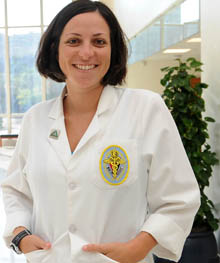Med students create classes tailored to their interests

Early on in medical school, Dr. Benjamin Azevedo, a May 2013 graduate, realized how important palliative and end-of-life-care was for medical professionals. He saw first-hand how well his mother, an educator and a former hospice nurse, dealt with patients who were dealing with incredible pain or nearing the end of their lives.
Azevedo approached faculty member Dr. Dominique Anwar, associate professor and director of the Palliative Care Program at Tulane, and together they developed a curriculum and objectives for a new elective to teach first-year students these important skills.
“We surveyed the student body to see if they were interested in this new elective. We found that students were below the curve in their understanding of palliative care and there was a strong amount of interest in learning more,” says Azevedo.
Medical students are still involved in the coordination of the class. Under the supervision of faculty, third-year medical student Melissa Schwab Keeport directs the elective with help from three second-year students: James Stoeckle, William Vail and Andrew Wickerham. They are passionate about helping medical students learn more about this important part of medicine.
“At Tulane, we saw that there was a need for further education in the field of end-of-life and palliative care, especially post-Katrina. Since implementing the elective, we've done extensive data collection on the students' experiences; there have been remarkable improvements in their capabilities,” Keeport says.
